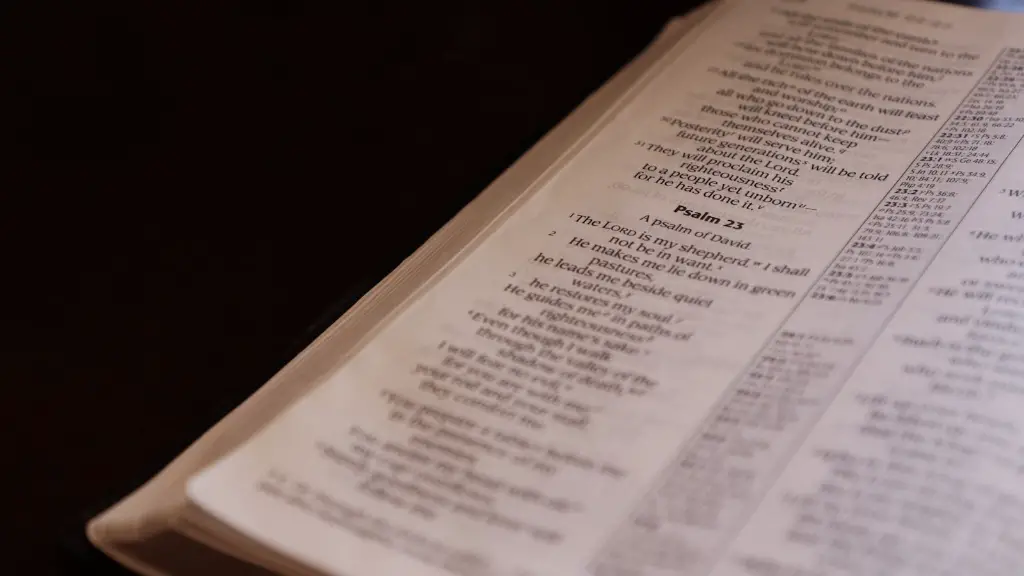What Does the Bible Say About Praying?
In a world filled with different spiritual paths, religions, and beliefs, it can be difficult to know what to believe or which path is the right one for you. However, one thing that all spiritual paths have in common is the power of prayer. It’s a spiritual practice that transcends boundaries, uniting us in a way that no other practice can.
The Bible is full of references to prayer and its power. One of the most famous references is found in the Bible’s book of Psalms, which is full of prayer-like passages that offer comfort and hope in times of need. The Bible often talks about how God rewards those who turn to him in prayer, and that He answers the prayers of the righteous.
The Bible speaks of prayer being an essential part of a person’s spiritual health, encouraging us to talk to God regularly. It says that prayer connects us with God, allows us to build a deeper relationship with Him, and strengthens our faith. It also speaks of the power of a community praying together, claiming that corporate prayer can have tremendous impact.
God also wants us to have faith in our prayers and have confidence that He will answer them, regardless of their outcome. He often shows us that He does answer our prayers, even when it’s not the answer we wanted. This gives us hope and strengthens our trust in Him.
The Bible also tells us that we should be mindful of how we pray, and that we shouldn’t rush our prayers or use them as a means to get what we want. Instead, we should pour our heart and soul into the prayer, and be earnest in our request.
At the same time, the Bible also warns us not to be too zealous in our prayers, as some can become too emotional and lose sight of the real intention of prayer, which is to build our relationship with God. It’s also important to remember that sometimes God’s answer is “no” and that we should accept His will and trust that His decision was made with our best interests in mind.
What Are the Benefits of Praying?
Prayer can offer many spiritual and mental benefits, leading to a more fulfilled life. Specifically, prayer can help us find peace and solace in difficult times, help us express our gratitude, and help us feel closer to God. It can also help us build strong relationships with others, both through praying with others as well as having them pray for us.
By talking with God, we can also improve our physical health, as numerous studies have suggested that prayer can help reduce stress, lower blood pressure, and improve emotional wellbeing. Prayer can also benefit those going through hard times, such as the loss of a loved one, by providing comfort and hope.
Prayer can even help us to overcome insecurity, anxiety, and fear. It can help us put our trust in God and leave our worries behind, leaving us with a new outlook on life. Praying can also provide us with clarity, like no other method can, letting us see the bigger picture of our situation and find guidance on how to move forward.
Finally, prayer can improve our spiritual health, leading us to a new level of understanding of our relationship with God. Through prayer, we can reach a deeper level of understanding and connection with the divine.
How Does One Pray?
Prayer doesn’t necessarily have to follow a certain formula. It’s really about being honest and open with God, and having a conversation with Him. It’s about giving thanks and expressing our fears and anxieties. Prayer can be done anywhere and anytime throughout the day. It can also be done in groups or alone, though praying in a group can be even more powerful and meaningful.
The Bible provides us with many examples of how to pray, so we can use that as a starting point. It’s helpful to begin by reading passages from the Bible, praising God, and expressing your requests to Him. However, the important thing is to find a routine and type of prayer that works best for you.
It’s also important to remember not to become overzealous in our expectations of prayer. Prayer is not necessarily a magical solution that answers all our problems, but instead more of a tool to bring us closer to God and to learn how to rely on Him.
Are There Any Rules for Praying?
Though there are no specific rules or guidelines for praying, the Bible does outline a few rules that should be taken into consideration. For starters, we should keep our prayers short and to the point. We should be humble in our prayers, and never beg or pressure God for something. It’s also important to pray with faith, trusting that He will answer our prayers in His own way.
We should also be respectful in our prayers, being mindful not to use it as a way to criticize or attack others. In addition, we should be honest and sincere in our prayers, and be open to God telling us “no” if that is His will.
Finally, we should avoid praying for selfish reasons or to gain self-glory. Prayer should be about building our relationship with God and deepening our faith, not about getting what we want.
What Does Praying do for Us?
Prayer can transform us in many ways and allow us to experience spiritual growth and transformation. It can provide us with clarity, comfort, and enhance our understanding of the divine. It can also help us to become more patient, humble, and loving. Prayer helps us to express our emotions, bridge the gap between us and God, and cultivate a more meaningful relationship with Him.
Prayer can help us in our daily lives, providing us with the spiritual strength needed to weather life’s storms and hardships. It can also help us to become more diligent in our work and to become more compassionate and understanding. Finally, prayer can offer us guidance, peace, and joy, allowing us to live a more meaningful and fulfilling life.
How Do We Know When God Answers Our Prayers?
God’s answers to our prayers can come in many different forms, and it’s up to us to recognize the signs. He could answer our prayers directly, with a “yes” or “no”, or He could provide us with guidance, direction, and insight. Sometimes He might even use other people or things to get His message to us.
If we remain open and patient, we might eventually be able to recognize God’s answer to our prayers. Often, it’s not an obvious answer, and it might take some time and reflection before we are able to recognize it. We should also remember that God’s answer can be different from what we expect, and that it’s up to us to trust that He has a plan.
What Are Generally Accepted Prayers?
The most well-known prayer is the “Our Father” prayer, which is based on a passage from the Bible’s Book of Matthew. This prayer is often used as a starting point for many other prayers. Another popular prayer is the “Lords Prayer” which is also based on a passage from the Bible. This prayer is short and focused on worshipping God and expressing our dependence on Him.
Other commonly accepted prayers include Psalm 23 and the Psalm of Thanksgiving. These two prayers are different from others in that they are less about asking for things and more about expressing our love, faith, and gratitude for God. These prayers can be especially powerful when things are feeling uncertain or when we feel overwhelmed by life.
Though there are certain prayers that are more commonly accepted than others, the most important thing is to find what works for you. Whether it’s a passage from the Bible, a repeated phrase, a traditional prayer, or your own words, find what resonates with you the most and pour your heart into the prayer.





